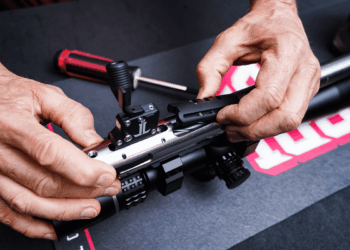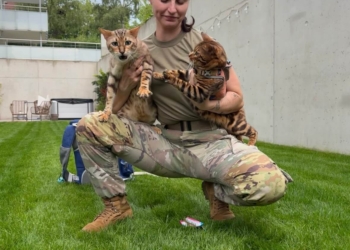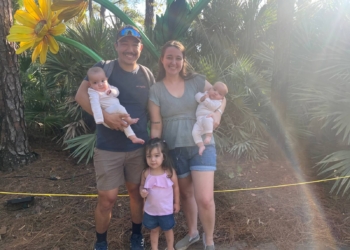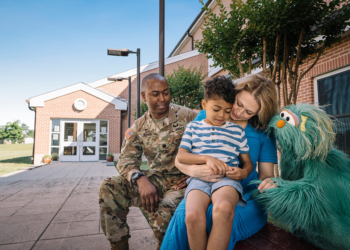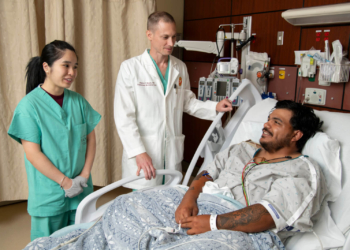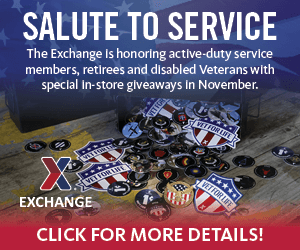Crystal Bethea hasn’t experienced post-traumatic stress, but she knows how it affects veterans and their families.
“I understand [from] my twin brother dealing with post-traumatic stress what goes on behind the scenes,” said Bethea, an Army veteran.
After her brother separated from the Army, he struggled to find employment, and his PTSD, compounded by depression and drug use, made adjusting to civilian life a challenge.
“[It] took him over 10 years to get himself together,” she said.
That’s why Bethea, who owns C3 Wellness Spa in central Florida, is a proponent of holistic treatments. With a paternal lineage of veterans and an equally expansive lineage of healers on her mother’s side of the family, Bethea wanted to merge her goal of helping veterans.
“I wanted to find a different way to treat and heal that was more holistic without going to school to [be a] nurse,” Bethea said.
Her experiences were compounded by reports of the ongoing opioid crisis and the number of veterans who had become addicted because of traditional pain treatments. A 2019 Substance Abuse and Mental Health Services Administration survey found that 595,000 veterans misused opioids like hydrocodone and oxycodone.
The social and economic impacts of physical ailments are unquantifiable, and many veterans are “just tired-tired of the number of pills they were taking and the side effects. Depression and anxiety seems to riddle the veteran community,” Bethea said.
Making a change
Bethea and Marcus Bethea, her husband and business partner, opened the first of two C3 Wellness Spas in Kissimmee, Florida, to effect change. Since 2019, they have provided a range of non-addictive pain treatments for more than 450 veterans.
Veterans experiencing chronic or lower back pain, among other ailments, are referred by their primary care physicians to the spa, where practitioners offer everything from acupuncture and massage to intravenous infusion and physical therapy. Appointments are readily available, most times within 24 hours.
RELATED: Organization hopes new suicide prevention committee considers brain injury treatments
This convenience is especially beneficial for clients like Army veteran LaToya Pritchard. Pritchard initially contacted C3 Wellness Spa after a friend’s recommendation. Seven years of boots and chutes – jumping out of airplanes – caused Pritchard to experience pain throughout her body. She believes the treatments she receives at the spa are “more timely and accurate” than at the VA.
“[I] feel like they work and have more options. [The Spa] has helped me over time versus going to the regular VA,” Pritchard said. “They’ve been consistent with helping my back, feet, and so on.”
VA-approved wellness
According to Dr. Donna D. Ferguson, chief of Behavioral Sciences Education and Training Division, U.S. Army, veterans often suffer in silence from debilitating conditions. The most cited reasons include living too far from a treatment facility, not knowing the signs of their conditions, and being unaware of supportive treatments due to perceived stigmas.
The recently updated VA Directive 1137 aims to address these barriers by allowing providers such as Bethea to offer non-addictive pain management treatments, otherwise referred to as complementary and integrative health approaches (CIH), to veterans. Eligible treatments include acupuncture, biofeedback, clinical hypnosis, guided imagery, massage therapy, and meditation.
Bethea said she wants “to help treat our veteran community holistically and let them know there is another way, to incorporate these [treatments] along with Western medicine to get the relief that they [desire].”
Bethea said veterans might be concerned that receiving CIH treatments for physical pain, anxiety, PTSD or other conditions may reduce or eliminate their disability benefits.
“I think a lot of them have a fear that when they start feeling better, they’re not going to be receiving their retirement or disability at the same rate, and that’s not the case,” Bethea said.
C3 Wellness Spa accepts private insurance to ensure continuity of care, which allows veterans to receive care more frequently without “having to pay out of pocket or feeling confined to only going through the VA to see us, “ Bethea said.
Understanding veterans and the issues they experience is a priority for Bethea and her staff.
“We do what we can to educate our vets as much as possible,” she said. “We have a group of people that are dedicated to making sure that they’re taken care of. They risked their lives for this country.
“We can’t let them fall by the wayside [because] their families depend on them, and they need to understand that they’re valued and cared for when they come back.”
Read comments



















